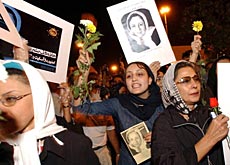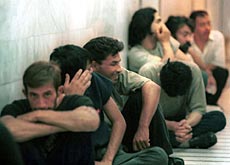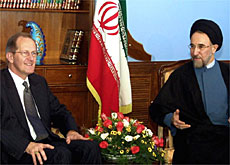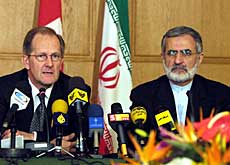Swiss make headway in Iran over human rights

A Swiss foreign ministry delegation has returned from a trip to Iran aimed at opening a dialogue on human rights.
swissinfo caught up with senior diplomat Peter Maurer, who led the Swiss mission, to find out what had been achieved.
During their stay, Swiss officials held talks with the Iranian authorities on prison reform, corporal punishment and the ratification of international human rights accords.
The Swiss government says it hopes to receive an Iranian delegation in the first half of 2004.
swissinfo: Human rights dialogue – what does that mean for a country such as Iran which comes in for a lot of international criticism for its human rights record?
P.M.: Firstly, it means we will have regular contact with the Iranian authorities to discuss human right issues.
Secondly, we would like to establish contact between Iranian and Swiss experts on some human rights issues which are of particular concern – penal law and prison affairs, for example.
Thirdly, we expressed our interest in working together with the Iranian authorities on minimum prison standards and on the education of prison guards in respecting human rights norms.
swissinfo: How did the Iranian authorities respond?
P.M.: One has to be aware that discussing human rights is not an easy issue with Iran. But they are certainly aware that there is room for improvement.
They are very sensitive about having a discussion that is on an equal footing – one that doesn’t involve an accusatory approach.
It is also interesting to see that many of the human rights issues which I touched upon in our discussions are also being very much discussed within Iranian society and the political establishment.
I think there is very much a debate going on between the clerical authorities on the one side, and parliament and government on the other side.
swissinfo: Do you think Switzerland is particularly well placed in the eyes of the Iranian authorities to mediate in this issue?
P.M.: We were certainly very well received in Iran, and I do have the impression that the Iranian authorities have maybe a more relaxed relationship with a country like Switzerland than they have with more powerful Western countries.
It’s a question of approach. We would hope that due to our good and longstanding relationship with Iran, we might be able to engage them into cooperating on human rights as well.
swissinfo: What concrete agreements were reached?
P.M.: We agreed we would look together into respecting minimum prison standards which have been agreed internationally. We have still to define the exact terms of such an eventual project.
Also we have agreed to have more direct contact with the judiciary and prison officials, so there will be more open and direct channels with the Iranian authorities to raise issues of concern in the future.
swissinfo: Iran was named as one of the “axis of evil” by the United States, and there is also the nuclear issue. How much of an impact did this have on your attempts to build a dialogue on human rights?
P.M.: I think it was quite obvious to me during the two days that the nuclear issue is one of top priorities for the Iranian authorities as well.
I certainly do hope it’s possible to find an agreement with the IAEA [International Atomic Energy Agency] because otherwise I fear, if the nuclear issue drags on longer and if there is not an international agreement on nuclear issues, this will certainly have a negative impact on continuing human rights discussions.
swissinfo: Why engage a country like Iran on its human rights record?
P.M.: Iran is an Islamic country and an important actor in its own region. In international politics, it’s one of the leading countries in the Group of 77 developing nations and in the United Nations.
I believe it is of crucial interest to encourage discussions on the Islamic understanding of human rights norms and international human rights norms. This goes far beyond Iran in its significance.
If we do achieve some progress with Iran, it may have an impact on other Islamic countries and it might enable a more rational discussion on universal human rights and its implementation in Islamic societies.
swissinfo-interview: Jonathan Summerton
Iran has been accused of supporting terrorism and remains the subject of United States sanctions.
Since the election of President Mohammed Khatami in 1997, relations with the West have been slowly improving.
But concerns over Tehran’s nuclear programme have put a strain on relations recently.
However, the UN nuclear watchdog has reported that Iran is ready to answer all its nuclear questions and sign an agreement allowing tougher inspections.

In compliance with the JTI standards
More: SWI swissinfo.ch certified by the Journalism Trust Initiative



You can find an overview of ongoing debates with our journalists here. Please join us!
If you want to start a conversation about a topic raised in this article or want to report factual errors, email us at english@swissinfo.ch.